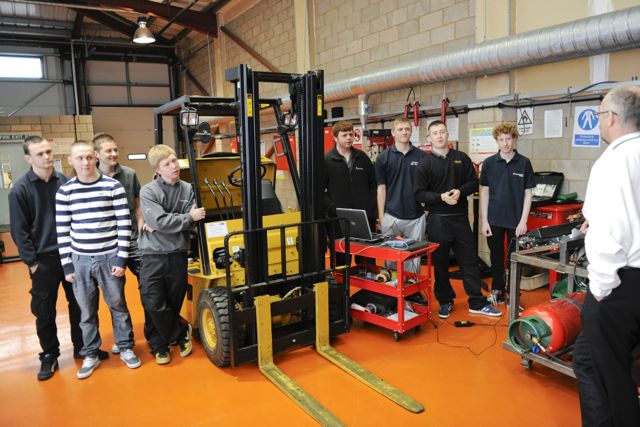 FLTA: Apprentices are a much more cost-effective way of building a skilled and effective workforce than appointing fully trained engineers from an ever dwindling pool of experienced engineers. |
Apprenticeships are good for business, and one in five UK employers are hiring more apprentices to help them through tough times.
Geoff Martin, chairman of FLTA, says there's nothing quite like a "home-grown" apprentice engineer. "They are the lifeblood of our industry."
According to the FLTA, up to 60% of the industry's experienced, specialist mechanics are due to retire by 2029, and with at least 200 qualified engineers needed every year just to maintain current service levels, a fresh infusion of new blood is critical to success.
A University of Warwick study has found that the costs of apprenticeship training are recouped relatively quickly, and where the investment is nurtured, the returns to that business are significant.
Paul Nichol, managing director of United Forktrucks, says: "Our apprentices are an absolute godsend. We invest the time in training them up, and we get a committed, talented young engineer at the end of it - which is so important to us as we continue to expand in the future."
Charlie Catallo, 18, of Lichfield is one of 60 apprentices starting work at JCB's Rocester headquarters under the company's GBP5 million (USD7.7 million) 'Young Talent' program. As part of the investment, the company is introducing the UK's first-ever apprenticeship geared towards international business, and Charlie is one of 13 JCB apprentices undertaking the qualification.
"I wasn't 100% sure of what I wanted to do, but wanted to do an apprenticeship and, with JCB being a global name and an international business, there is no better place to start your career. I'm really looking forward to completing an apprenticeship which will give me an insight into all aspects of the business," Catallo says.
JCB is creating almost 130 new jobs with its Young Talent program. The investment will see the bulk of the new apprentices and graduates join the business this northern summer.
With over 20% of young people aged 16-24 unemployed and the average 15- to 19-year-old in Britain spending 2.5 years out of work, there is plenty of young talent available, the FLTA says.
How do apprenticeships work?Apprenticeships are on-the-job training leading to nationally recognised vocational competence qualifications, developed by the industry itself.
During their apprenticeships, trainees must receive a wage (at least the national minimum wage, which for apprentices is GBP2.65/USD4.07 per hour).
The cost of the actual training is subsidised, in full or in part, by the National Apprenticeship Service (NAS).
The amount of the subsidy depends on the age of the apprentice. If they are 16-18 years of age, the NAS will pay for 100% of the training; if aged 19-24, this drops to 50%.
So employers who take on a 16- to 18-year-old apprentice will only pay their salary; the Government will fund all of their training.
In order for forklift companies to place their new apprentices on the right course, employers are advised to check the relevant Ofsted report for their chosen college by visiting the Ofsted website at:
http://www.ofsted.gov.uk/inspection-reports/find-inspection-report. All that's required is to enter the college's postcode in the address section.
A recent survey showed that almost half of senior managers in UK forklift companies started their careers as apprentices. They represent not just the engineers on the shop floor, but also the next generation of managers and business leaders.
For more information, visit the FLTA apprenticeship microsite:
http://forktruckapprentice.org.uk/.